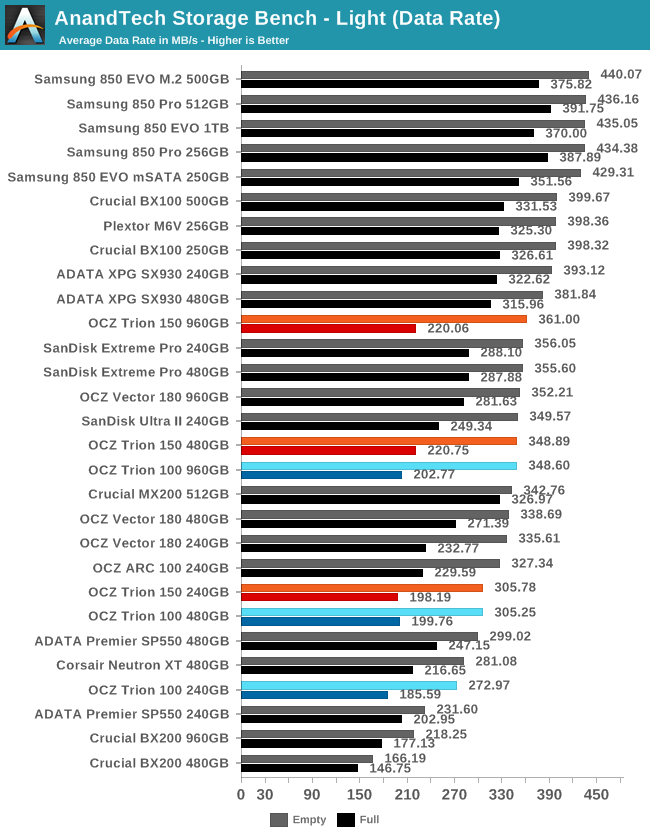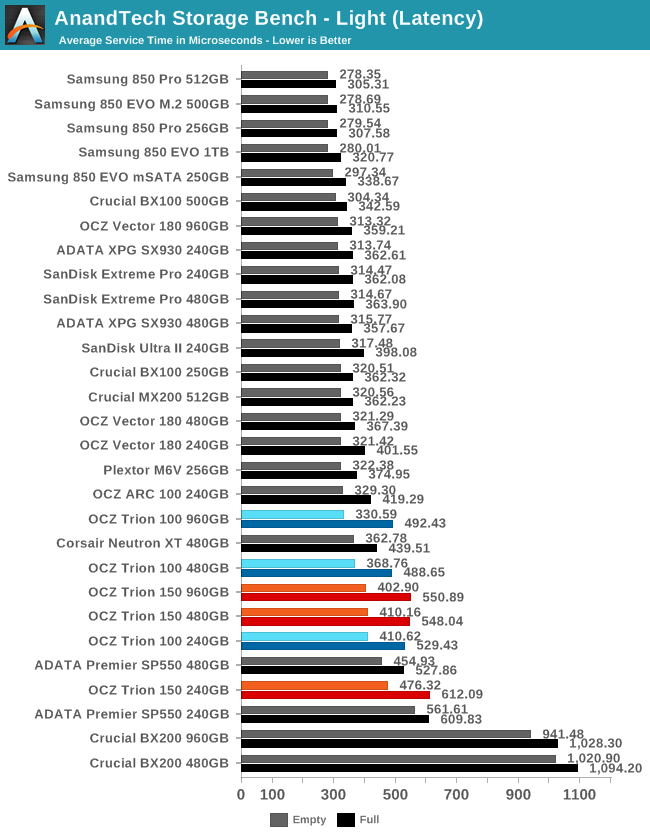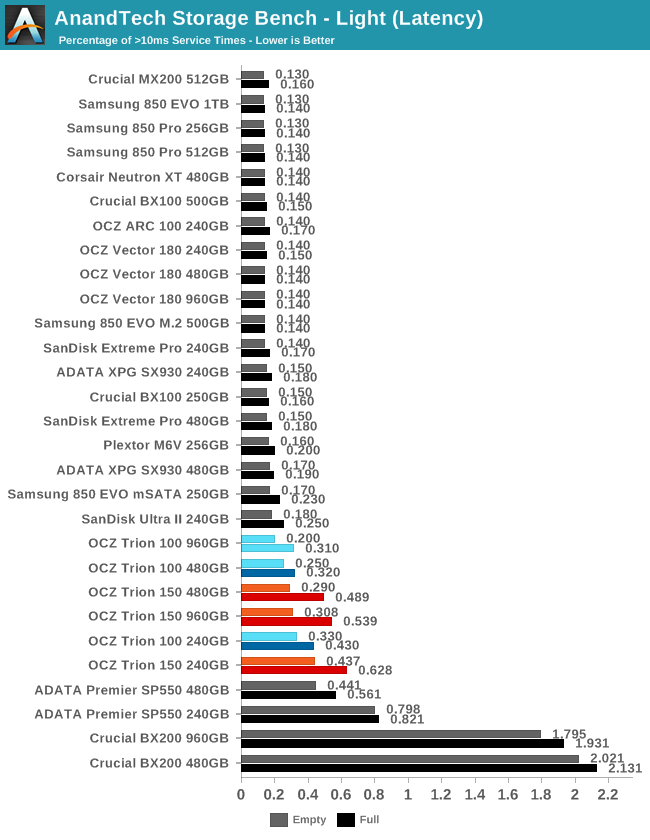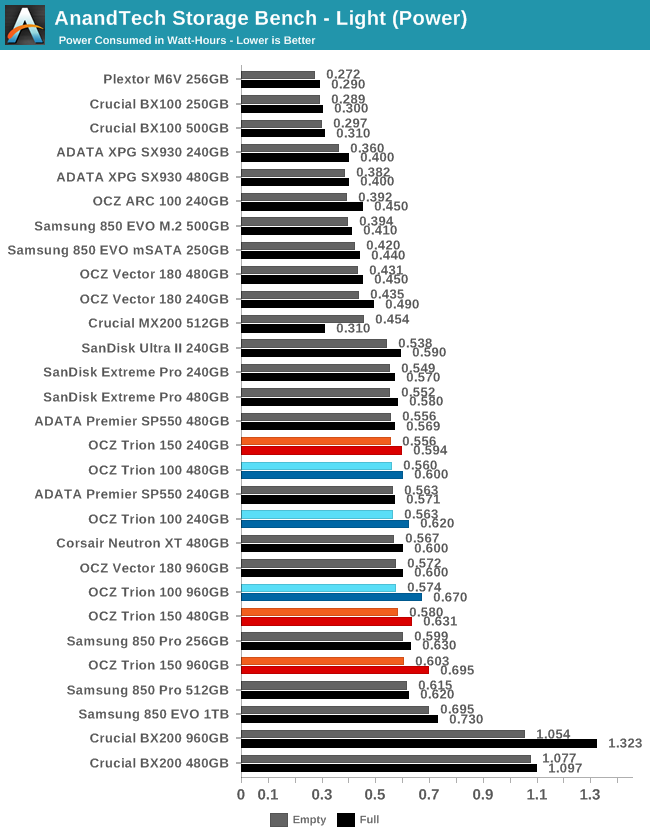The OCZ Trion 150 SSD Review
by Billy Tallis on April 1, 2016 8:00 AM ESTAnandTech Storage Bench - Light
Our Light storage test has relatively more sequential accesses and lower queue depths than The Destroyer or the Heavy test, and it's by far the shortest test overall. It's based largely on applications that aren't highly dependent on storage performance, so this is a test more of application launch times and file load times. This test can be seen as the sum of all the little delays in daily usage, but with the idle times trimmed to 25ms it takes less than half an hour to run. Details of the Light test can be found here.

On the Light test, each Trion 150 manages a slightly higher average data rate than the Trion 100 of twice the capacity. The Trion 100 and 150 continue to show the largest discrepancies in performance when the test is run on a full drive instead of an empty drive.

Average service times have regressed slightly from the Trion 100 to the Trion 150, but the results are all still reasonable, especially for a budget drive.

The latency regression and full-drive penalty both show up more clearly when looking at the number of high-latency outliers than when comparing average service time.

Power consumption on the Light test has not changed meaningfully and the Trion 150's energy usage is perfectly normal.










79 Comments
View All Comments
Arnulf - Friday, April 1, 2016 - link
So not only is this a low-end drive, it's an OCZ low-end drive.Thanks for the article and giving consumers heads-up so that we don't get burned!
Arnulf - Friday, April 1, 2016 - link
Ugh, EDIT function pretty please ...So not only is this a low-end drive, it's an overpriced OCZ low-end drive.
close - Friday, April 1, 2016 - link
I wouldn't call this a "burn" but it's definitely a warm beer after a hot summer day.LB-ID - Friday, April 1, 2016 - link
<Wanders in, sees another OCZ drive review><Reads the review, sees nothing has really changed>
<Wanders out to buy from a reputable brand>
Samus - Saturday, April 2, 2016 - link
I now feel like Toshiba is a Trojan horse, because all the OCZ drives that were in the buffer during bankruptcy and released after Toshiba initially bought them, in particular the exceptional ARC 100, were a sign they were turning things around.Then Toshiba releases this crap under the OCZ name. WTF are they thinking OCZ is a performance focused brand and these drives are clearly marketed at grandma's old Dell laptop.
xrror - Wednesday, April 6, 2016 - link
Yea but I think Toshiba's plan was to use OCZ for ALL of their customer facing drives. Before they bought OCZ they simply didn't offer retail drives at all!As far as a Toshiba Trojan horse... Toshiba actually had a competent drive itself right before it bought OCZ.
The Toshiba THNSNH drives were actually good (they don't bench awesome, but they're good) but since they were OEM only you've never heard of them. THNSNH was also a big jump from Toshiba's prior drives that seemed mostly made for industrial (performance wasn't great, but HDD wouldn't handle vibration/shock).
Bonus that Toshiba kept OCZ's in development models, so you had the ARC series come out. (vs. something ... not so nice like continuing Octane). But those were Marvell (I think) based with Indilinx firmware? Nothing wrong at all with that, but I imagine Toshiba's shareholders would question why they weren't using native Toshiba tech...
I'm actually really glad Toshiba of anyone (also, a surprise!) was able to snag the OCZ engineering team. Yea everyone loves to hate on OCZ, but OCZ really was the first company to so extremely aggressively bring SSD drives to the consumer market. Everyone likes to hate on Ryan Petersen but damnit, he really DID push to make SSD drives an affordable "thing" much MUCH sooner than just Intel alone would have.
They had a really rough time pounding out the bugs with SandForce yes... but seriously - who could have predicted that? (no, SERIOUSLY - before the kneejerk reaction, imagine being in OCZ's development shoes - that had to be really tough cause each time they thought they had it fixed, and it was always something very subtle). I always find it interesting that everyone forgets that their Indilinx controllers just worked - but they weren't the "sexy" fastest.
Saying that, I totally understand people who... after forking out their $600+ on a drive and having failure after RMA failure after "no this firmware really fixes it honest" failure upon failure would yea... swear off OCZ forever. But today's OCZ isn't that. Different time, place, era.
This comment has gone way too long. And I've lost my point lol.
And so you all don't think I'm a forgive and forget person. I'll never buy another Kingston product after the asshattery with the V300. When a company basically tells Anand himself to piss off when they bait and switch the NAND used...
http://www.anandtech.com/show/7763/an-update-to-ki...
Hey, at least Ryan Peterson and OCZ back then was super responsive to Anand directly when they got ripped a new one ;)
xrror - Wednesday, April 6, 2016 - link
Ugh, and I just realized I didn't address the part of using the OCZ name for non-performance parts.Basically, unless you're Samsung right now nobody is a performance part. And so that doesn't sound like a hipster "well, duh" answer - Samsung went crazy (awesome!) insane mad R&D into controllers and 3D NAND. Holy moly they even kicked Intel's butt enough so that Intel announces vaporware crosspoint memory.
I mean, halo effect in SATA market at least is crazy! SanDisk has some very extremely competitive models in their high end - but because they're maybe 3% slower in some benchmarks? Nobody on the street cares. That's nuts.
I dunno, I guess my point is that unless Toshiba/OCZ can somehow squeeze 12Gb/s through a SATA 3 link (I joke) they're not going to be able to market as a performance product these days.
Actually, the killer solution I think is to make an SSD controller that is both power efficient and makes TLC NAND not suck (so much). And that's not easy. At all. Cause small process planar TLC really a physics nightmare. I mean that's taking crappy flash drive memory and getting it to perform. Not easy.
leexgx - Sunday, April 24, 2016 - link
maybe i been unlucky i had to many sandisk SSDs (3) and SD (more than 5) cards fail (failing as what is in my phone right now about to funny enough change it for a 32GB EVO+)i do wish they would make more SSDs like the BX100 its the most power effect SSD i have ever seen (the BX200 and MX200 the very bad) BX100 is not very fast for a SSD but in laptops its very low power
jasonelmore - Saturday, April 2, 2016 - link
Still mad about that OCZ rebate scandal i see.Leyawiin - Sunday, April 3, 2016 - link
No, its a Toshiba low end. Do try and keep up.